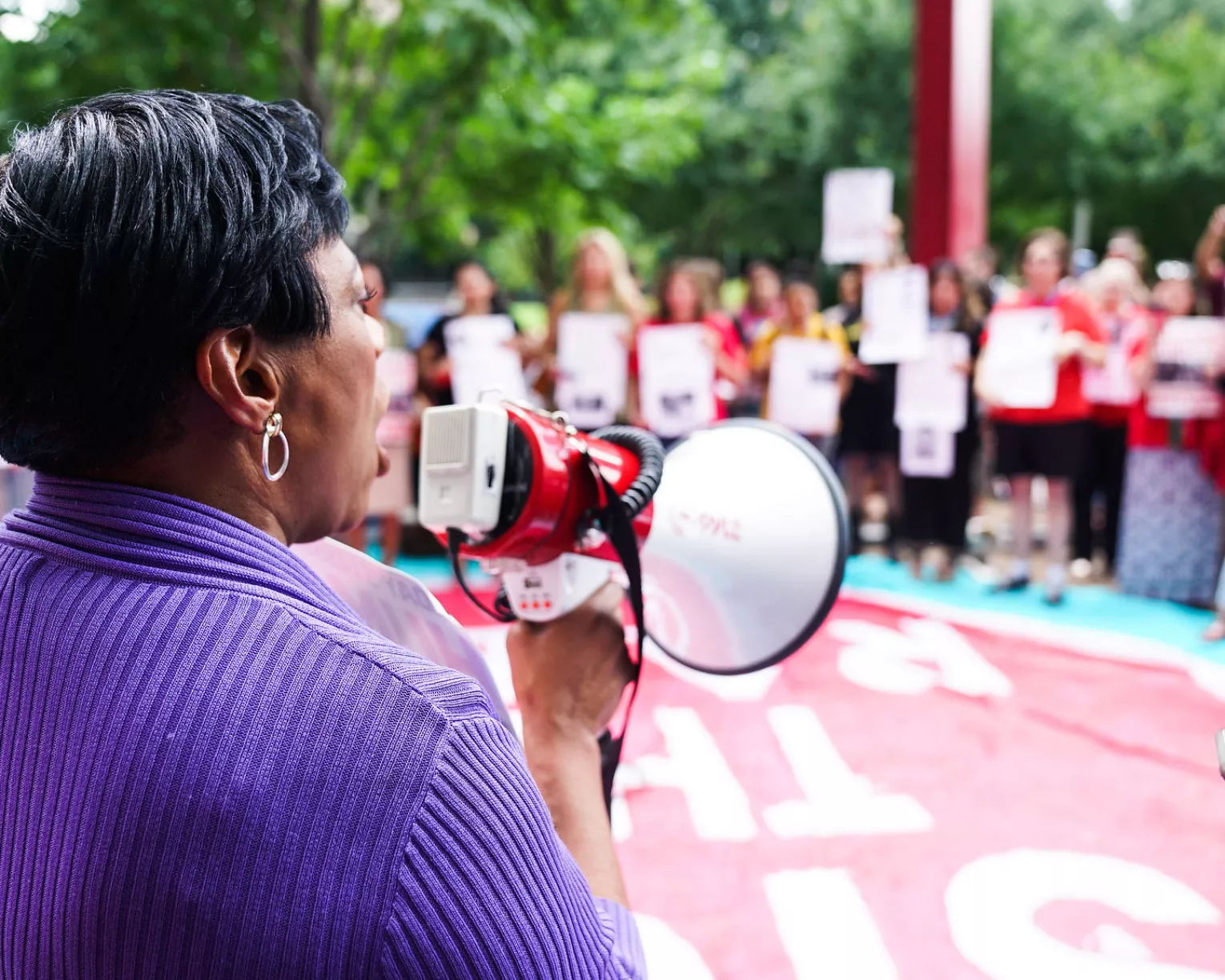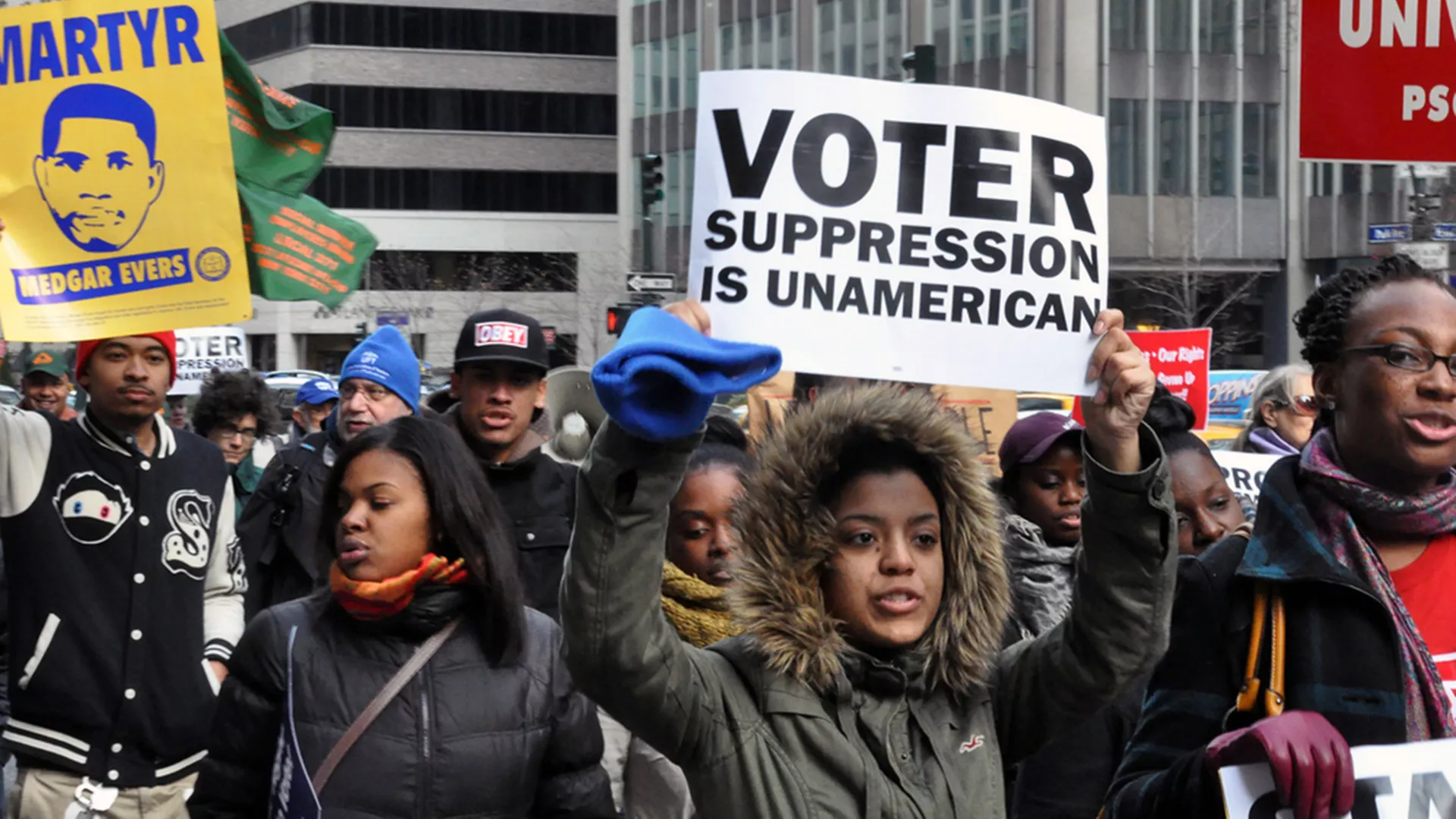Key Takeaways
- Every voter deserves to have fair access to cast a ballot and make their voice heard.
- Unfortunately, after federal protections were weakened in 2013, a rash of voter suppression legislation followed in many states.
- Educators are working to restore federal protections for voting rights--and you can take action today.
When thousands of pro-Trump protestors violently stormed the U.S. Capitol last Jan. 6th in an attempt to overturn the results of the 2020 presidential election, it marked one of the most direct assaults on our democracy in history. But instead of working to strengthen our institutions since that deadly day, policymakers in statehouses across the country have only continued to erode support for fair and free elections by pushing voter suppression laws that seek to disenfranchise the voices of many Americans.
Protecting voting rights is critical in the fight for strong public schools. Most policies affecting education are made on the state and local levels, where elections are often decided by slim margins. With outside groups—many led by right-wing agitators—already trying to leverage manufactured outrage to take control of local school boards, even a minor erosion of bedrock voting rights can fundamentally reshape the fabric of our schools.

Educators like Derron Cook—a high school art teacher in St. John the Baptist Parish, Louisiana—know that efforts to suppress voting rights harm our nation, our democratic institutions, and the integrity of our public schools.
"Voter suppression keeps folks within marginalized communities from receiving a fair and equal education,” Cook says. “As educators, it’s only right that we stand up to fight voter suppression and champion voting rights laws, especially when it comes to ensuring funding for our schools and students.”
An activist for social and racial justice and vice president of the local chapter of the NAACP, Cook says the sacrifices of the civil rights giants before us who fought, bled, and died for the right to vote makes the battle for voting rights even more meaningful. Last year, he participated in an anti-voter suppression demonstration in Washington, D.C. alongside Rev. Jesse Jackson, Dr. William Barber, and Senator Raphael Warnock (D-Ga.), and says he continues to participate in local voter registration and mobilization efforts outside the classroom.
Cook, who keeps voter registration forms in his classroom for interested students, says educators must speak out against voter suppression efforts that seek to minimize civic participation and involvement.
"We need lawmakers who know that educators are on the forefront when it comes to making sure our students are educated, well-cared for, and fed,” Cook says.
Restricting the Right to Vote
The rash of voter suppression legislation in recent years marks the culmination of a troubling trend of legal decisions that weakened federal protections for many American voters.
Back in the 1960s, state and federal officials used overt methods to suppress racial, ethnic, and language minority voters’ voices, relying on literacy tests, violence and intimidation, poll taxes, and other blatant tactics to limit the electoral participation of voters of color. The Civil Rights Movement helped spur on passage of the Voting Rights Act of 1965 (VRA), which outlawed discriminatory practices that result in Americans receiving unequal access to the ballot box.
Even as partisan lawmakers continued to stoke unfounded fears of voter fraud in the ensuing years, passage of the VRA helped lead to an increase in Black voter registration and voting. But the pushback against voting rights came to a head in 2013, when the Shelby County v. Holder U.S. Supreme Court decision invalidated the VRA’s “preclearance requirement,” which helped determine which states and localities had to pre-clear any changes to their voting laws with the Department of Justice. The decision resulted in a number of states rushing to pass legislation curtailing the right to vote. The Supreme Court dealt another blow to voting rights last year in Brnovich v. Democratic National Committee by making it more difficult to challenge racial disrimination in voting laws.
These decisions—coupled with the persistent, and wholly misleading, claims of voter fraud in the 2020 presidential election among some political quarters—have given radical state policymakers the go-ahead to introduce a bevy of onerous voter suppression legislation.
Last year, at least 19 states passed 34 laws making it harder for Americans to vote in elections. Similar legislative efforts to curtail access to the ballot box are already underway in Michigan, Pennsylvania, and Wisconsin—three battleground states that determined the outcome of the 2016 and 2020 presidential elections. These voter suppression laws largely target low-income voters, voters of color, and those with disabilities, making it more difficult for them to vote early, receive mail-in ballots, and readily access voting locations. With radical state policymakers continuing to push legislation that would curtail the right to vote, it’s up to Congress to protect the right to vote for all Americans.
Congress Must Act to Protect Voting Rights
Federal policymakers have the ability to take a bold stand in support of free and fair elections—and it’s critical that they act soon.
To combat the wave of restrictive voting laws that have cropped up on the state level, the House of Representatives passed two bills to defend voting rights: the John Lewis Voting Rights Advancement Act and the Freedom to Vote Act. The John Lewis Voting Rights Advancement Act, named for the late-congressman and civil rights icon, would reverse the Supreme Court’s misguided decisions in Shelby County and Brnovich and restore the VRA’s full protections. And the Freedom to Vote Act would, among other things, make Election Day a federal holiday, expand early voting in all 50 states, and create a national standard for mail-in ballots.
Despite House passage of both bills, however, Senate Republicans have used the filibuster to block any action on these critically needed efforts to strengthen voting rights. Frustrated by the lack of progress to defend free and fair elections, President Joe Biden this week forcefully called for the Senate to set aside the filibuster in order to pass both voting rights bills, calling it “the moment to defend our democracy.” Senate Majority Leader Chuck Schumer (D-N.Y.) has already announced plans to bring forward a vote by Martin Luther King Jr. Day to change the Senate filibuster rules if Republicans continue to block the voting rights bills.
Americans of all backgrounds cannot afford to wait any longer for Congress to step up and defend our voting rights. And we owe it to our students to defend their access to the ballot box before it is too late. In a statement marking the one-year anniversary of the U.S. Capitol riot, NEA President Becky Pringle urged Congress to safeguard our elections and the future of public education by quickly passing these important pieces of legislation.
“We know that our public schools are more than places of learning—they are the foundation of our democracy,” Pringle said. “And we see how our students are not only witnesses to the relentless attacks on voting rights nationwide—oftentimes they are targeted by the restrictive voting rights bills in states across the nation.”
Passage of the John Lewis Voting Rights Advancement Act and the Freedom to Vote Act will ensure that the future of public education is shaped by elected leaders who have the well-being of all of their constituents close to heart. And combating voter suppression efforts will enable all communities to have an equal say in the democratic process.

Tamika Walker Kelly, president of the North Carolina Association of Educators and an elementary school music specialist in Fayetteville, North Carolina, says protecting the right to vote is critically important when it comes to defending the future of public education.
"We say public schools are a public good, and the way we ensure they continue to be a public good is by having the public freely exercise their right to vote,” says Kelly, who has taught in the Cumberland County Schools for more than 14 years. “Our schools are a reflection of our communities. When we vote for policymakers at the school board level up to the federal level, that has a direct impact on the success of our communities.”
Kelly says educators concerned about the erosion of voting rights should engage with their lawmakers, attend town halls, and become more involved in the government relations work of their unions. And, she adds, the voter suppression efforts underway across the country should only push educators to become even more involved in the democratic process.
“We cannot afford to sit out elections because the people who make policies that affect public education—including how it’s run and how it’s funded—come from who we vote for,” Kelly says.



